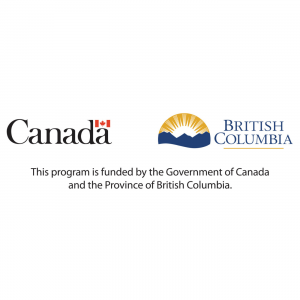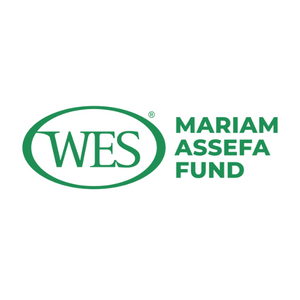Mohammed Zaqout came to Canada as a visitor in the summer of 2019, a year and a half after leaving his home in Palestine. He decided to stay, and after a few months, he stepped into the process of becoming a refugee claimant. He has since participated in three of RADIUS’ Refugee Livelihood Lab programs: Beyond Borders, Trampoline, and the RADIUS Fellowship. He regrets none of it, except maybe that he does not have a certificate to recognise his journey.
Struggling to find a place to live while he navigated his resettlement and got to know a new city, Mohammed found himself living in a low-barrier shelter on Vancouver’s Downtown Eastside. The immigration system “can be a little complex,” he says with a sigh. “All the different things that any human being needs to get settled in a new place — it’s just hard. And finding the support that you need is sometimes even harder.”
Out of desperation, he began cold calling around, looking for a short-term room to rent. One of those calls was to SFU. He knew it was a long shot and wasn’t surprised when they couldn’t help, but they took his name and phone number just in case they thought of anything. To his surprise, a few days later, his phone rang. The person he spoke with passed his number on to someone in another department, who then passed it on to the team at RADIUS. “Someone with the same family name as myself calls me and introduces themselves,” he recalls. “She’s the one who told me about the Lab.”
The Lab’s focus on shifting systems and supporting newcomers regardless of their immigration status immediately resonated with Mohammed. “That was one of the very first spaces that I walked into where your status does not matter,” he says. “And I was like, okay, this is different.”
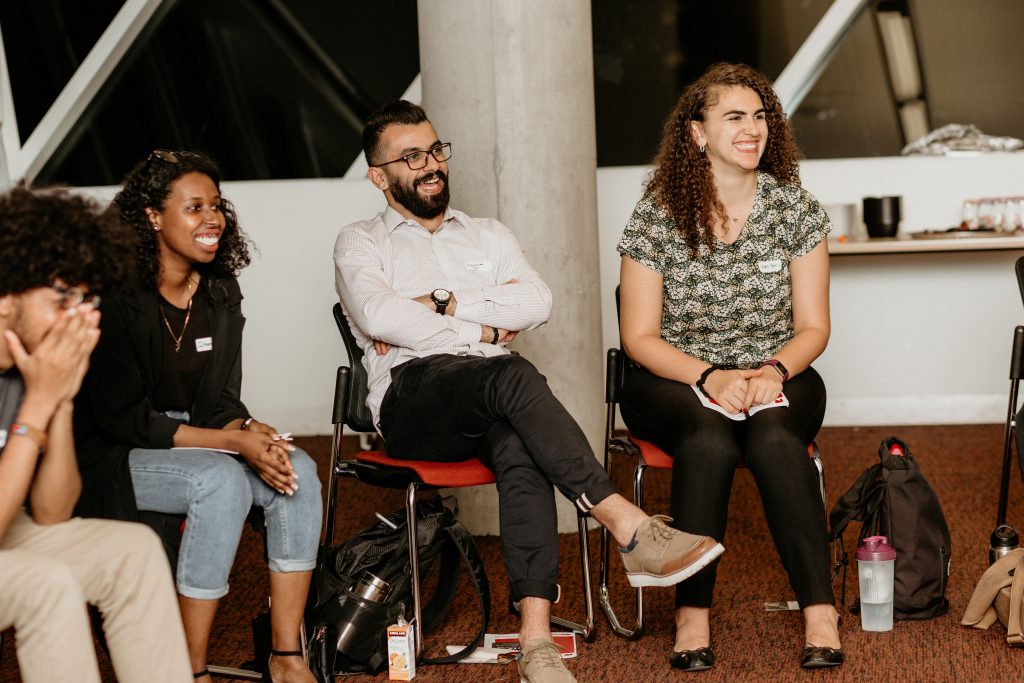
After applying to Beyond Borders, the program that preceded the Refugee Livelihood Lab’s current (certificate granting) Migrant Systems Change Leadership certificate program, Mohammed recalls arriving at RADIUS for his interview: “Walking into RADIUS, I was like, oh, this is such a cool workplace. So nice. They have a kitchen and a dining space. What? Oh, there’s a nap room. What the heck? I love it. The people are all smiles and welcoming. It felt like a warm place.”
It wasn’t just the environment that suggested this might be a place where it was safe to let his guard down a little — this interview was unlike any other interview he could remember. “We just started talking about how it’s been challenging,” he recalls. “I’ve been in the country for two months, seeking connection and community. And here was a moment of grounding…how this person is and the way they listen and the way they care.”
On the first day of Beyond Borders, Mohammed looked around during the cohort introductions. “People were way more settled than I could ever imagine,” he says. “I was still in the shelter for the first session or two…I looked up to everybody as an example. It was good to get to know people.”
Beyond Borders was key in helping Mohammed along his settlement journey. The program’s focus on understanding the roots and impacts of systems of power and oppression taught him about Canada — and Canada’s relationship to Indigenous peoples and the land — in a way that he hadn’t been taught before, and that really resonated with him. He reflects, “My great grandparents were Indigenous Palestinians who fled their hometown, Isdud, during occupation. I was born and raised in a refugee camp in Gaza, so I see many parallels to the displacement and discrimination in Canada’s story with what my family and I have experienced. I think this is a very important piece to learn, and it has significantly changed the way I live my life, how I show up in different spaces, and the way I look at Canada. How I look at the land now is different because of it; I’ve been just realigning my values, trying to be present and intentional about how I want to live my new life here.”
The sense of connection that Mohammed and the community of participants, program facilitators, and advisors developed also began to slowly shift his outlook. “I would sit back a little bit and breathe,” he says. “I’m figuring a lot out as I go, but I’ve got so much in the background that is happening that I’m escaping, too. Doing the different activities, the deeper we got into conversations was just really grounding for me.”
During the retreat held in Squamish, the program community continued to bond. “It felt like a dream,” Mohammed recalls. “It was my first time out of the city. Spending time with folks on that retreat, out in the woods doing those walks and having those conversations, having food together, it introduced me to so many people that have impacted my life. People that I continue being friends with, being mentored by in different ways, learning from, and working within different capacities, even now. It’s those relationships that I value so much.”
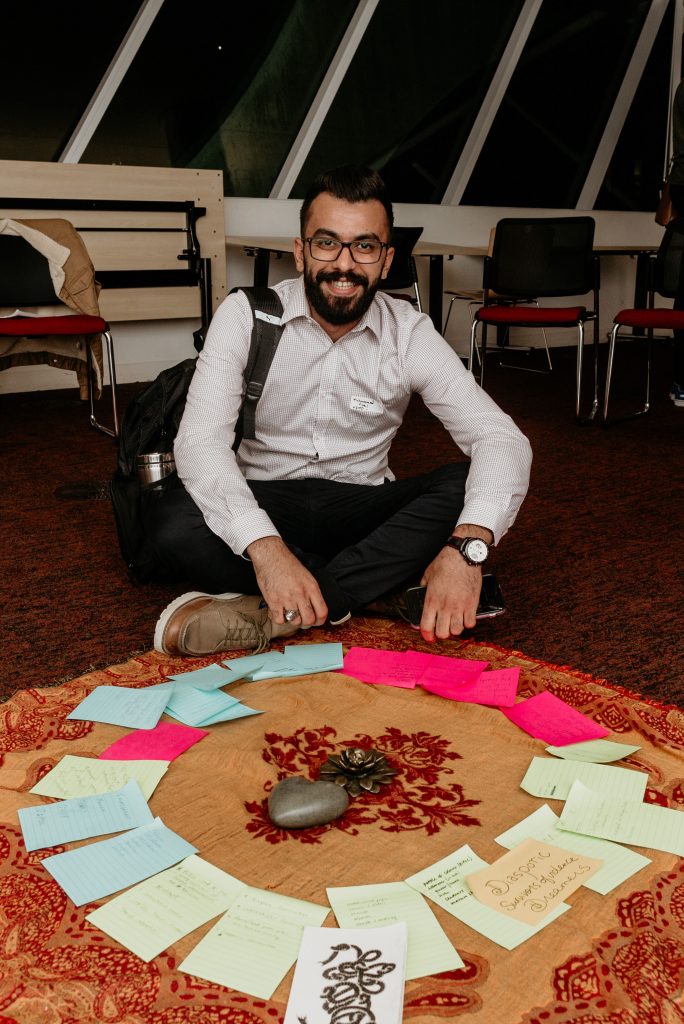
Being part of Beyond Borders helped Mohammed see that his voice matters. “I can agree, but I also can definitely disagree,” he says. “And knowing that was really important to me.” The program introduced him to the idea that systems can shift and even change — if people work towards developing new narratives. Though he might not have known it at the time, this idea of new narratives was one he would carry forward in his work over the years to come.
Mohammed began his work experience in Canada as a volunteer settlement worker with Zaytuna Services Society in Surrey, B.C., in the fall of 2019 — a connection he made thanks to the same friend who introduced him to the Lab. He could tell his work was helping people, and it gave him a sense of purpose. “I enjoyed being able to connect with people,” he says. “I saw a bit of a future in doing that.” He started to imagine ways to create even more positive impact.
The Lab’s Trampoline program provided some incubation space for Mohammed’s idea around developing a connection pool to support refugee claimants in building their relational networks and finding employment opportunities. During the program, he worked to gather data and to present and speak to organisations and people around this topic. A part-time role as a research assistant and country co-investigator on the Global Leadership and Organizational Behavior Effectiveness (GLOBE) research project for the Beedie School of Business at SFU also contributed to his learning during this time. In this role, he translated over 200 surveys into different dialects of Arabic to facilitate data collection for the study and developed an understanding of how Palestinian people and companies are thinking about employment, organisational effectiveness, and leadership.
Eventually, Mohammed’s work at Zaytuna Services Society opened an opportunity for him to take on an internship role with Multi-Agency Partnership (MAP) BC, a network of different government agencies and NGOs working collaboratively to identify barriers and find solutions to promote the protection and well-being of refugee claimants and service providers. When one of the MAP BC partners, Kinbrace Community Society, was hiring a housing support worker, Mohammed applied and got the job. Looking back now, Mohammed can pinpoint three elements that contributed to his successful appointment at Kinbrace:
- His settlement work at Zaytuna Services Society, where he worked with clients in English and Arabic on issues related to settlement, including housing.
- His involvement with MAP BC and his place at the table with many different organisations that work to help refugee claimants.
- His connection to the Refugee Livelihood Lab.
Mohammed’s work at Kinbrace eventually began in June 2020, three months after COVID-19 was declared a global pandemic. Feeling isolated by the pandemic’s restrictions and looking once again for ways to serve the community, he found himself pitching his connection pool idea as part of the RADIUS Fellowship’s final presentations. In the crowd, another Fellow listened to Mohammed’s idea and later invited him to collaborate on The Impact Coalition, a timely non-profit designed to help youth overcome the challenges presented by the pandemic. As part of the Coalition team, Mohammed got to exercise many of his skills, including grant writing, project coordination, and social media strategy co-development, and he was also a panellist for industry conversations that tackled relevant issues like the housing crisis, youth empowerment, mental health issues, and Justice, Equity, Decolonisation, Diversity, and Inclusion (JEDDI).
Meanwhile, at Kinbrace, Mohammed’s frontline role as a part-time housing support worker, a very frontline position, created space for him, through his lived experience, to build trust and personal connections with refugee claimants.
By listening to what residents, clients, and others in the community had to say about what was working and what wasn’t, the Kinbrace team expanded their understanding of what supports are most helpful and identified gaps for those with claims in process. They understood that to have a real impact on refugee claimants’ financial stability and mobility, they needed to focus their efforts. Mohammed’s part-time role grew to a full-time role as a housing and employment worker as Kinbrace started to build its employment program. With the launch of the Achieving Financial Mobility Project, Mohammed’s role shifted again, this time to the role of Project Coordinator that he holds today. The work Mohammed is doing at Kinbrace is close to his heart. “So much of their mission aligns with my own,” he says. “They are so supportive and committed to creating lasting impact around employment for refugee claimants, and it just feels like it’s the right place to be. I feel like we’ve come so far in the past three years with my time at Kinbrace, in learning together. And I’m just really, really grateful for it.”
As the work on the connection pool at Kinbrace continues to develop in the form of the upcoming launch of the Transforming Employment Narratives (TEN) program, Mohammed is reminded of something he learned during Trampoline: you can’t love your project so much that you can’t let it go. “We’re doing something fairly different these days, but it’s based on the original idea,” he explains. “The TEN program takes all of our learning to date and keeps building on it to spark systems change by reimagining employment. It will be a cohort model that brings 16–20 participants, made up of refugee claimants, employers, HR professionals, and settlement workers, together to deepen our collective understanding and envision how we change recruitment, hiring practices, and staff care to better serve refugee claimants and employers.”
“I feel great about it,” he says, “because I can see it’s for a bigger purpose. The system has not been built to consider refugee claimants; it’s not inclusive.” He offers an example: “One of my very first experiences when I wanted to volunteer — to actually give my energy, time, and commitment towards something — I was told, ‘You are a refugee claimant. We can’t have you on board.’ Work permit processing times can be prohibitive, so volunteering is often an important pathway to Canadian workplace experience for newcomers, but a police record check is not available for those who have been in Canada less than six months, and many volunteer-seeking organisations require criminal record checks to confirm eligibility. “So,” Mohammed says, “imagine what I would think of the system when it comes to work, jobs, and paid work, you know? I would never imagine in a hundred years that I would be denied even a volunteer opportunity. I thought you needed volunteers continuously? Why is it so hard?”
While some employers are very supportive and interested in participating in the TEN project or donating funds to support this work, others are less ready, have big assumptions or hesitations, or just see too many barriers. Through considering his own experience and gathering data through conversations, Mohammed has recognised a real need for advocacy work to create systems change. Some old narratives need to be shifted, and a fully functional connection pool could go a long way towards shifting those, but he says, “There is a much deeper issue below the waterline. It might not work as well as we’d like it to if the system itself is not dismantled.”
Employers need to be taught about who refugee claimants are, to learn about their journeys, and to understand that connections need to be built so that they are genuinely willing and ready to hire refugee claimants.
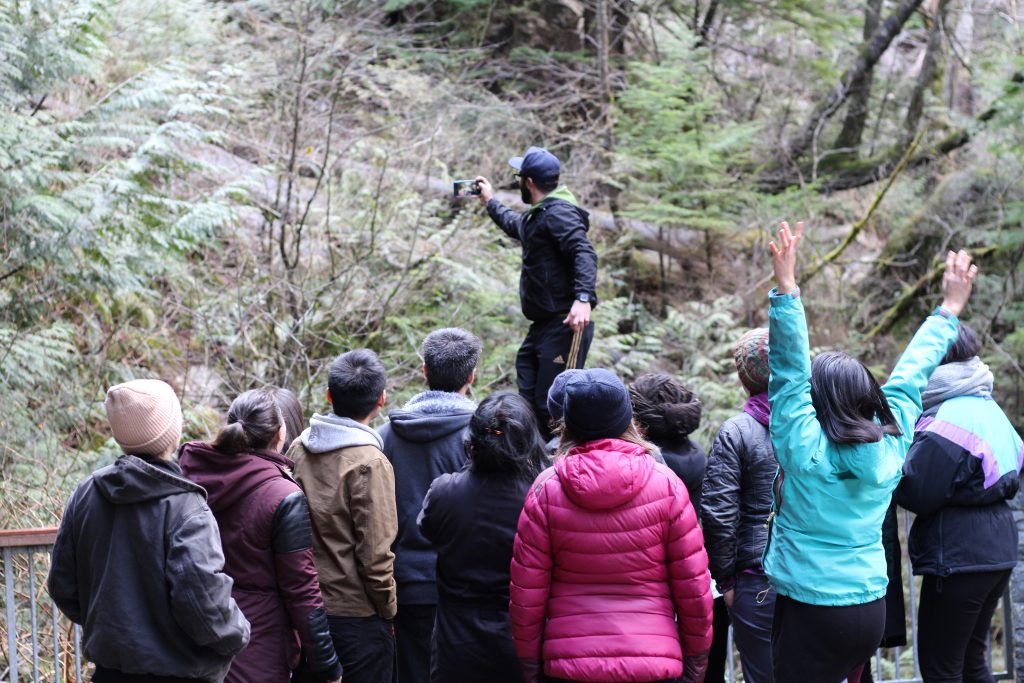
Here, Mohammed attributes some of his capacity for these conversations to the RADIUS Fellowship. Acknowledging that he works in a “tough sector,” he sees that the learning and skills he developed in the Fellowship have supported him in the meetings he has with employers. “Having courage to have uncomfortable conversations about the immigration system, colonialism, and inclusion,” is a change in his leadership he has noticed over time. “Those are not easy to have conversations about and, from one organisation to another, can be received differently,” he says.
He says of the Fellowship, “It gave me the vocabulary, it gave me the energy, and it gave me the ways to engage with different people.” Then he offers another insight he associates with his experiences with the Lab: “I learned to take ownership in my own story and learned how to be vulnerable. Now I can connect my personal lived experience and professional experience in a way that serves the conversation.” He offers an example of developing the confidence to begin having open conversations with others, at work and within his personal relationships, about Islam, the colonisation of Palestine, and the continued oppression of Palestinian people. “Showing up and being myself and learning, like that is how I want to be present in this system,” he says.
Looking ahead, Mohammed has a lot on the go. In addition to his work with Kinbrace’s Transforming Employment Narratives program, he’s also working in close collaboration and partnership with Islamic Relief Canada and Islamic Relief Palestine to lead the launch of the Gaza Media Co-op, which will provide training and skills development for its members, and to build an international client base and revenue stream. And Mohammed’s RADIUS journey is far from complete! Going forward, he will support the work of the Refugee Livelihood Lab as an advisor, bringing his experience to bear in service of program development. He’s also excited for the next program in his personal RADIUS learning journey: the BUILD program, where he will continue to explore issues of belonging and inclusivity in the workplace. BUILD is designed to help initiatives that are currently active to refine their model and grow their impact. The project Mohammed is bringing into this program is a worker’s co-op called LightWork, which will focus on strengthening the skills and confidence of its participants, helping them to shape and develop their own initiatives that will promote justice and belonging through safer, more inclusive, and more diverse work environments. He shares excitedly, “LightWork is a living example that shows what BIPOC folks, newcomers, and refugees are capable of. This initiative stands for economic solidarity and stands up for Justice in the work by walking the journey of change alongside organisations to create environments where differences are valued through a culture of care.”
Reflecting on his arc with the Refugee Livelihood Lab, Mohammed sums it up nicely, describing, “…a beautiful transition from Beyond Borders, where I was really understanding what Canada is, what the system looks like, how messed up it is, how much we need to shift the system; to Trampoline and being able to articulate those challenges; and then go into a very deep, relational kind of learning with the Fellowship.” Despite not having a certificate to recognise his achievements, a fact that he acknowledges with a smile, Mohammed’s time with the Lab felt meaningful. He says proudly, “I think I’ve done it correctly in terms of being engaged, and I feel just so privileged and lucky to be actually doing it.”
The Refugee Livelihood Lab is part of a growing movement supporting deep shifts in the systems which govern our lives towards equity, dignity, and sustainability for all people and the planet.
Thank you to our funders Ministry of Social Development and Poverty Reduction, and WES Mariam Assefa Fund (MAF).
